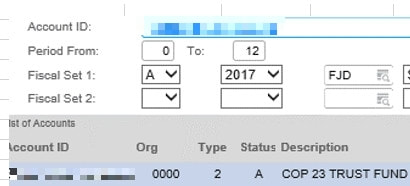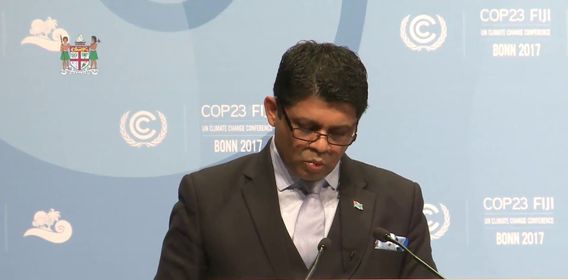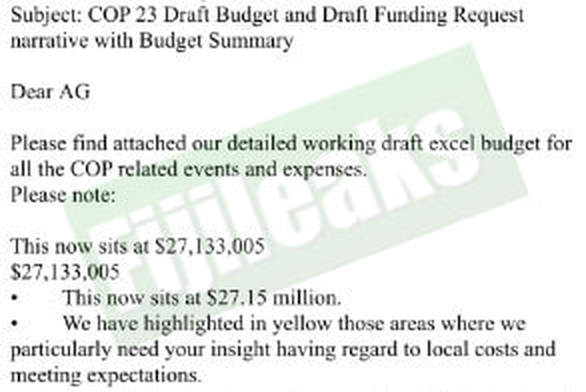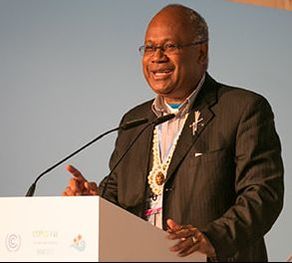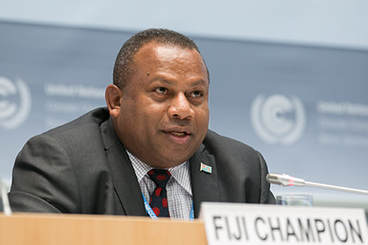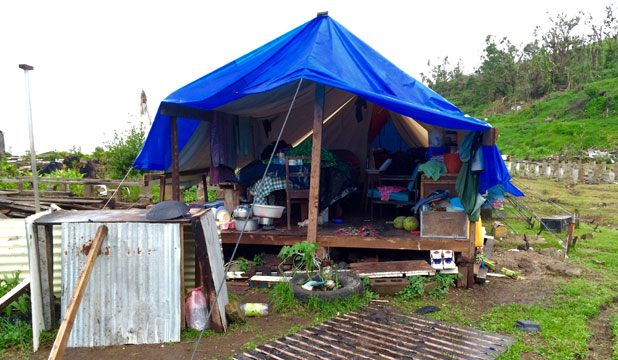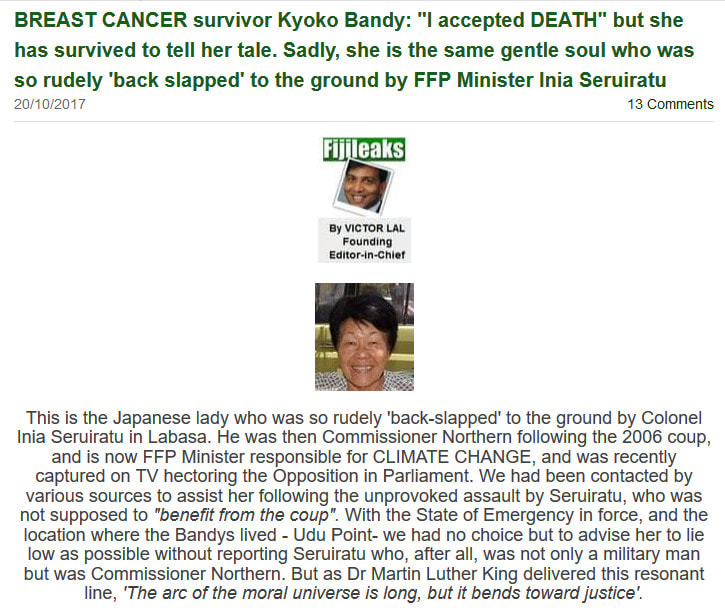Two and half million at disposal of Bainimarama and Khaiyum for COP23
WAIT! Bainimarama had assured Parliament that no funds would be diverted from other Ministries to fund COP 23. So why $245,508.01 was diverted from MOE?
MOE: MINISTRY OF ECONOMY under the control of Aiyaz Sayed Khaiyum, the
MINISTER RESPONSIBLE FOR CLIMATE CHANGE
From Fijileaks Archive, 20 October 2017
Large scale welcome ceremony to greet COP 23 delegation was not government’s intention - AG
The Attorney General and Minister Responsible for Climate Change Aiyaz Sayed‑Khaiyum has highlighted that having a large-scale welcome ceremony to greet the COP 23 delegation was not the intent of the government, the Prime Minister or his team but was the result of independent planning by a few well‑intentioned but perhaps naive civil servants.
Sayed-Khaiyum says some people are making political points after the success of COP 23.
He says they accomplished far more than the state parties expected Fiji to do so.
Sayed-Khaiyum says that Fiji is now more than a vacation spot and a rugby powerhouse to the international community, as it is now a global leader at the forefront of the most pressuring issue of our time that is climate change.
He says they have attracted hundreds and millions of dollars in green infrastructure projects that will be rolled out in the next few years that will not only make Fiji more climate resilient but will boost a thriving economy.
What were the main benefits to Fiji after COP23?
Fijivillage had asked Sayed-Khaiyum to give details on how it will benefit Fijians after the meeting.
Sayed‑Khaiyum says the climate change leadership has already yielded many fruits domestically.
He says projects from the World Bank, the Green Climate Fund, the European Investment Bank and the Leonardo Dicaprio Foundation will make our villages and rural areas more secure, water and electricity cleaner and helps in building a brighter and more resilient future.
The Attorney General says the value of all the exposure Fiji gained from the COP is immense and there is no monetary value to it.
This also came at zero expense to the Fijian taxpayer thanks to generous support from the international community.
He says while the responsibility is great, it is one with the continuous support.
The European Investment Bank has partnered with the Fijian Government to fund a water and wastewater investment programme to better protect water infrastructure against natural disasters in Fiji and strengthen the resilience of water distribution and wastewater treatment.
The project will focus on improving current service levels, reduce leakages and enable quicker resumption of water supply following cyclones.
They have signed a $75 million loan agreement to support the project.
The Drua Insurance Incubator will be an important new initiative to develop finance and insurance products that are tailor‑made to the needs and circumstances of vulnerable and low‑income households in Fiji and other Pacific Island Countries.
The Government of Luxembourg has agreed to provide initial funding of 1 million euros for the initiative.
At the request of the Fijian Government, the World Bank carried out a Climate Vulnerability Assessment of Fiji to identify the scale of climate risks posed to Fiji to better inform climate adaptation measures.
The assessment determined Fiji’s annual losses due to extreme weather events could reach 6.5% of GDP by 2050 and that an estimated $9.3 billion over the next 10 years is required to finance adaptation work across Fiji.
The assessment will have a direct impact on Fiji's critical climate adaption work to ensure resources are allocated appropriately in vulnerable regions across the country.
At COP23, Australia also committed an additional $9.4 million towards the initiative to support efforts to protect and manage coastal blue carbon ecosystems in the Pacific, in partnership with Fiji and other Pacific Island Countries.
While important work remains to be done, COP23 made significant progress toward clear and comprehensive implementation guidelines for the Paris Agreement, which will make the agreement operational.
This is crucial to help governments plan their economies, and give confidence to investors and businesses that the low‑carbon economy is here to stay.
Countries will need to finalise the implementation guidelines at COP24 in Poland next year.
The Fijian COP23 Presidency launched the Ocean Pathway Partnership to encourage the climate negotiations process to address the relationship between climate change and the ocean.
The German Federal Ministry for Economic Cooperation and Development (BMZ) contributed 110 million euros to launch the InsuResilience Global Partnership for Climate and Disaster Risk Finance and Insurance Solutions to bring affordable insurance and other financial protection to millions of vulnerable people around the world.
The contribution from BMZ follows a £30 million commitment that was made by the Government of the United Kingdom in July.
Launch of the Fiji Clearing House for Risk Transfer: This new online resource will help connect vulnerable countries with the best available information on affordable insurance and solutions – tailored to their unique circumstances – that will allow them to better prepare for the risks posed by climate change.
Countries also finalised the first‑ever Gender Action Plan. It also seeks to increase awareness of and support for the development and effective implementation of gender‑responsive climate policy at all levels of government.
A new platform will provide direct and comprehensive means to give a greater voice to local and indigenous people in the climate negotiations and allow them to share their traditional knowledge and best practices on reducing emissions, adapting to climate change and building resilience.
Countries also reached a historic agreement on agriculture that will help countries develop and implement new strategies for adaptation and mitigation within the sector, to both reduce emissions as well as build resilience to the effects of climate change. This was historic because it was the first time in the history of the climate negotiations that countries had reached an agreement on agriculture.
The Adaptation Fund was also replenished with a total of US $93.3 million, exceeding this year’s funding target by US $13 million. The Adaptation Fund has a track record of providing valuable resources to communities in developing countries for projects that help improve resilience to the effects of climate change.
A delegation of sub‑national US leaders led by Gov. Jerry Brown of California and former New York City Mayor Michael Bloomberg presented a report on the ongoing efforts by American states, cities, businesses and civil society to uphold the emissions reduction target of the United States under the Paris Agreement.
Local and regional leaders gathered to officially adopt the Bonn‑Fiji Commitment of Local and Regional Leaders to Deliver the Paris Agreement at All Levels, a pledge that signals their commitment to bring forward a critical shift in global development.
The Bonn‑Fiji Commitment highlights the pledge to raise collective ambition for climate action.
The World Health Organisation has also launched a special initiative to protect people living in Small Island Developing States from the health impacts of climate change.
Its goal by 2030 is to triple the levels of international financial support to climate and health in Small Island Developing States.
The Fijian COP23 Presidency also presided over the first ever Open Dialogue between governments and non‑state actors (including civil society, municipal governments and businesses) within the formal climate negotiations.
The Attorney General has also confirmed that the President of France Immanuel Macron called for a similar sort of meeting for all the leaders on the 12th of December which the Prime Minister will be attending and more new initiatives are expected to be announced. Source: Fijivillage News, 24 November 2014
Sayed-Khaiyum says some people are making political points after the success of COP 23.
He says they accomplished far more than the state parties expected Fiji to do so.
Sayed-Khaiyum says that Fiji is now more than a vacation spot and a rugby powerhouse to the international community, as it is now a global leader at the forefront of the most pressuring issue of our time that is climate change.
He says they have attracted hundreds and millions of dollars in green infrastructure projects that will be rolled out in the next few years that will not only make Fiji more climate resilient but will boost a thriving economy.
What were the main benefits to Fiji after COP23?
Fijivillage had asked Sayed-Khaiyum to give details on how it will benefit Fijians after the meeting.
Sayed‑Khaiyum says the climate change leadership has already yielded many fruits domestically.
He says projects from the World Bank, the Green Climate Fund, the European Investment Bank and the Leonardo Dicaprio Foundation will make our villages and rural areas more secure, water and electricity cleaner and helps in building a brighter and more resilient future.
The Attorney General says the value of all the exposure Fiji gained from the COP is immense and there is no monetary value to it.
This also came at zero expense to the Fijian taxpayer thanks to generous support from the international community.
He says while the responsibility is great, it is one with the continuous support.
The European Investment Bank has partnered with the Fijian Government to fund a water and wastewater investment programme to better protect water infrastructure against natural disasters in Fiji and strengthen the resilience of water distribution and wastewater treatment.
The project will focus on improving current service levels, reduce leakages and enable quicker resumption of water supply following cyclones.
They have signed a $75 million loan agreement to support the project.
The Drua Insurance Incubator will be an important new initiative to develop finance and insurance products that are tailor‑made to the needs and circumstances of vulnerable and low‑income households in Fiji and other Pacific Island Countries.
The Government of Luxembourg has agreed to provide initial funding of 1 million euros for the initiative.
At the request of the Fijian Government, the World Bank carried out a Climate Vulnerability Assessment of Fiji to identify the scale of climate risks posed to Fiji to better inform climate adaptation measures.
The assessment determined Fiji’s annual losses due to extreme weather events could reach 6.5% of GDP by 2050 and that an estimated $9.3 billion over the next 10 years is required to finance adaptation work across Fiji.
The assessment will have a direct impact on Fiji's critical climate adaption work to ensure resources are allocated appropriately in vulnerable regions across the country.
At COP23, Australia also committed an additional $9.4 million towards the initiative to support efforts to protect and manage coastal blue carbon ecosystems in the Pacific, in partnership with Fiji and other Pacific Island Countries.
While important work remains to be done, COP23 made significant progress toward clear and comprehensive implementation guidelines for the Paris Agreement, which will make the agreement operational.
This is crucial to help governments plan their economies, and give confidence to investors and businesses that the low‑carbon economy is here to stay.
Countries will need to finalise the implementation guidelines at COP24 in Poland next year.
The Fijian COP23 Presidency launched the Ocean Pathway Partnership to encourage the climate negotiations process to address the relationship between climate change and the ocean.
The German Federal Ministry for Economic Cooperation and Development (BMZ) contributed 110 million euros to launch the InsuResilience Global Partnership for Climate and Disaster Risk Finance and Insurance Solutions to bring affordable insurance and other financial protection to millions of vulnerable people around the world.
The contribution from BMZ follows a £30 million commitment that was made by the Government of the United Kingdom in July.
Launch of the Fiji Clearing House for Risk Transfer: This new online resource will help connect vulnerable countries with the best available information on affordable insurance and solutions – tailored to their unique circumstances – that will allow them to better prepare for the risks posed by climate change.
Countries also finalised the first‑ever Gender Action Plan. It also seeks to increase awareness of and support for the development and effective implementation of gender‑responsive climate policy at all levels of government.
A new platform will provide direct and comprehensive means to give a greater voice to local and indigenous people in the climate negotiations and allow them to share their traditional knowledge and best practices on reducing emissions, adapting to climate change and building resilience.
Countries also reached a historic agreement on agriculture that will help countries develop and implement new strategies for adaptation and mitigation within the sector, to both reduce emissions as well as build resilience to the effects of climate change. This was historic because it was the first time in the history of the climate negotiations that countries had reached an agreement on agriculture.
The Adaptation Fund was also replenished with a total of US $93.3 million, exceeding this year’s funding target by US $13 million. The Adaptation Fund has a track record of providing valuable resources to communities in developing countries for projects that help improve resilience to the effects of climate change.
A delegation of sub‑national US leaders led by Gov. Jerry Brown of California and former New York City Mayor Michael Bloomberg presented a report on the ongoing efforts by American states, cities, businesses and civil society to uphold the emissions reduction target of the United States under the Paris Agreement.
Local and regional leaders gathered to officially adopt the Bonn‑Fiji Commitment of Local and Regional Leaders to Deliver the Paris Agreement at All Levels, a pledge that signals their commitment to bring forward a critical shift in global development.
The Bonn‑Fiji Commitment highlights the pledge to raise collective ambition for climate action.
The World Health Organisation has also launched a special initiative to protect people living in Small Island Developing States from the health impacts of climate change.
Its goal by 2030 is to triple the levels of international financial support to climate and health in Small Island Developing States.
The Fijian COP23 Presidency also presided over the first ever Open Dialogue between governments and non‑state actors (including civil society, municipal governments and businesses) within the formal climate negotiations.
The Attorney General has also confirmed that the President of France Immanuel Macron called for a similar sort of meeting for all the leaders on the 12th of December which the Prime Minister will be attending and more new initiatives are expected to be announced. Source: Fijivillage News, 24 November 2014


